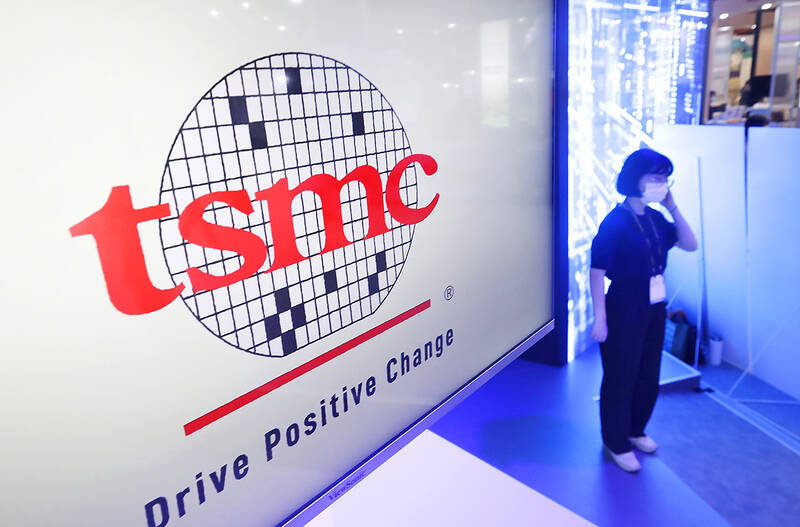Taiwan Semiconductor Manufacturing Co (TSMC, 台積電) and GlobalFoundries Inc have finished negotiating binding agreements for billions of dollars in grants and loans to support US factories, sources familiar with the matter said.
The deals, announced as tentative agreements earlier this year, come as US President Joe Biden’s administration races to get CHIPS and Science Act money out the door before the end of its term in January.
It is unclear when the agreements would officially be signed and the incentives unveiled, said the sources, who asked not to be identified because the conversations are private.

Photo: Chiang Ying-ying, AP
The award amounts are roughly in line with the preliminary agreements, the sources said.
TSMC’s package announced in April includes US$6.6 billion in grants and as much as US$5 billion in loans to support the construction of three semiconductor factories in Phoenix. GlobalFoundries’ agreement from February is for US$1.5 billion in grants and as much as US$1.6 billion in loans to support a new plant in New York state, as well as expansions of existing facilities there and in Vermont.
TSMC, GlobalFoundries and the US Department of Commerce declined to comment.
The CHIPS Act set aside US$39 billion in grants — plus billions more in loans and 25 percent tax credits — to revitalize US semiconductor manufacturing after decades of production shifting to Asia. It has generated 10 times that amount in promised private investment, including factories for advanced chips, older-generation semiconductors and supply chain components.
More than 20 companies are in line to win US government funding, and they have spent months undergoing a due diligence process after negotiating preliminary accords. There is also almost US$3 billion left to divvy up into preliminary agreements.
That means it is extremely likely that some of the funding would be finalized under the leadership of Donald Trump, who would take the White House in January.
Once contracts are signed, money would be disbursed in tranches based on project-specific milestones.
Industry officials are anxious to get things squared away as quickly as possible, to allow money to start flowing to projects that have hit those benchmarks as well as due to recent comments from Trump disparaging the program as “so bad.”
It is not yet clear what Republican control would bring. US House of Representatives Speaker Mike Johnson on Friday last week said that he wants to “streamline” the law, after floating — and then immediately walking back — the possibility of a wholesale repeal.

CHIP RACE: Three years of overbroad export controls drove foreign competitors to pursue their own AI chips, and ‘cost US taxpayers billions of dollars,’ Nvidia said China has figured out the US strategy for allowing it to buy Nvidia Corp’s H200s and is rejecting the artificial intelligence (AI) chip in favor of domestically developed semiconductors, White House AI adviser David Sacks said, citing news reports. US President Donald Trump on Monday said that he would allow shipments of Nvidia’s H200 chips to China, part of an administration effort backed by Sacks to challenge Chinese tech champions such as Huawei Technologies Co (華為) by bringing US competition to their home market. On Friday, Sacks signaled that he was uncertain about whether that approach would work. “They’re rejecting our chips,” Sacks

It is challenging to build infrastructure in much of Europe. Constrained budgets and polarized politics tend to undermine long-term projects, forcing officials to react to emergencies rather than plan for the future. Not in Austria. Today, the country is to officially open its Koralmbahn tunnel, the 5.9 billion euro (US$6.9 billion) centerpiece of a groundbreaking new railway that will eventually run from Poland’s Baltic coast to the Adriatic Sea, transforming travel within Austria and positioning the Alpine nation at the forefront of logistics in Europe. “It is Austria’s biggest socio-economic experiment in over a century,” said Eric Kirschner, an economist at Graz-based Joanneum

BUBBLE? Only a handful of companies are seeing rapid revenue growth and higher valuations, and it is not enough to call the AI trend a transformation, an analyst said Artificial intelligence (AI) is entering a more challenging phase next year as companies move beyond experimentation and begin demanding clear financial returns from a technology that has delivered big gains to only a small group of early adopters, PricewaterhouseCoopers (PwC) Taiwan said yesterday. Most organizations have been able to justify AI investments through cost recovery or modest efficiency gains, but few have achieved meaningful revenue growth or long-term competitive advantage, the consultancy said in its 2026 AI Business Predictions report. This growing performance gap is forcing executives to reconsider how AI is deployed across their organizations, it said. “Many companies

France is developing domestic production of electric vehicle (EV) batteries with an eye on industrial independence, but Asian experts are proving key in launching operations. In the Verkor factory outside the northern city of Dunkirk, which was inaugurated on Thursday, foreign specialists, notably from South Korea and Malaysia, are training the local staff. Verkor is the third battery gigafactory to open in northern France in a region that has become known as “Battery Valley.” At the Automotive Energy Supply Corp (AESC) factory near the city of Douai, where production has been under way for several months, Chinese engineers and technicians supervise French recruits. “They